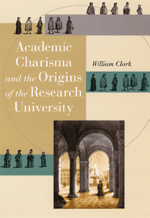Review: Clark, Academic Charisma and the Origins of the Research University
 The October 23 issue of the New Yorker has a fascinating review by Anthony Grafton of William Clark’s Academic Charisma and the Origins of the Research University:
The October 23 issue of the New Yorker has a fascinating review by Anthony Grafton of William Clark’s Academic Charisma and the Origins of the Research University:
Clark thinks that the modern university, with its passion for research, prominent professors, and, yes, black crêpe, took shape in Germany in the eighteenth and nineteenth centuries. And he makes his case with analytic shrewdness, an exuberant love of archival anecdote, and a wry sense of humor. It’s hard to resist a writer who begins by noting, “Befitting the subject, this is an odd book.”
It’s also hard to resist Grafton’s review when it’s titled “The Nutty Professors” and asks some perfectly sensible questions:
Why, in the age of the World Wide Web, do professors still stand at podiums and blather for fifty minutes at unruly mobs of students, their lowered baseball caps imperfectly concealing the sleep buds that rim their eyes? Why do professors and students put on polyester gowns and funny hats and march, once a year, in the uncertain glory of the late spring?
Why indeed? Clark shows how the university developed in response to market forces and the intrusiveness of the state bureaucracy, and established itself as a self-regulating research enterprise. Academic Charisma and the Origins of the Research University investigates the origins and evolving fixtures of academic life: the lecture catalogue, the library catalog, the grading system, the conduct of oral and written exams, the roles of conversation and the writing of research papers in seminars, the writing and oral defense of the doctoral dissertation, the ethos of “lecturing with applause” and “publish or perish,” and the role of reviews and rumor.
Extending Clark’s history into the present, Grafton writes:
Today, academic charisma—and the ascetic life of scholarship that goes with it—retains a central place in the life of universities. Scholars in all fields continue to gain preferment because they are “productive” (the academic euphemism for obsessive), and students continue to emulate them. Future investment bankers pull all-nighters delving into subjects that they will never need to know about again, and years later, at reunions, they recall the intensity of the experience with something close to disbelief—and, often, passionate nostalgia. The university has never been a sleek, efficient corporation. It’s more like the military, an organization at once radically modern and steeped in color and tradition.